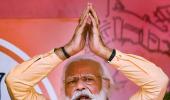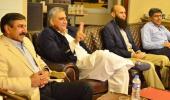'If there is a background of some kind of mutual understanding on how the dialogue process might develop in a mutually satisfactory manner...'
'If this understanding impacts positively on the ground situation...'
'As of now this is a heroic assumption. But it does not have to remain such.'

Ashraf Jehangir Qazi, former Pakistan high commissioner to India and former ambassador to the US and China, tells Aditi Phadnis there is reason for cautious optimism about prospects of normalising India-Pakistan relations.
Given that India and Pakistan now don't even have envoys in each other's countries, is it too optimistic to interpret recent events -- the ceasefire agreement, the Indus Waters Treaty talks, and others -- as a beginning of re-engagement?
Indeed, a very welcome re-engagement process between India and Pakistan may be said to have got under way.
The question -- and the challenge -- is how far it will go and for how long it can be sustained.
There have been several bilateral dialogues in various formats in the past.
They have often had a temporarily positive if not significant impact on the state of relations between the two countries.
They have, however, never built much mutual trust and momentum.
Over the years the perceptions, narratives, and politics of India and Pakistan about each other have become so comprehensively negative that discussions on core concerns -- mainly cross LoC 'terrorism' for India and the human and political rights situation in Indian-held Kashmir for Pakistan -- inevitably and frustratingly take on a zero-sum character.
Both sides tend to talk at or past each other on these issues.
Our narratives and politics do not make space for each other's point of view.
This has become an even greater challenge since August 5, 2019 (alteration of Jammu and Kashmir's status).
This raises the question whether any broad understanding such as a possible road map to address each other's core concerns was even tentatively reached in preliminary contacts before the late February joint statement of the two DGMOs (directors general of military operations) regarding the LoC and addressing core concerns was announced.
If so, we may be cautiously hopeful.
India recently made changes in Jammu and Kashmir's status. Is Pakistan ready to bury the past in the interests of geo-economics, which army chief General Qamar Bajwa flagged in his speech?
While General Bajwa did speak of burying the past and the importance of geo-economics, along with PM Imran Khan he made clear this would require reciprocity from India and the latter further clarified this was with reference to the situation in Jammu and Kashmir, especially since August 5, 2019.
If this is seen by the Indian government as placing 'unacceptable preconditions' for a dialogue process to begin, this initiative may be short-lived.
But if there is a background of some kind of mutual understanding on how the dialogue process might develop in a mutually satisfactory manner -- and if this understanding impacts positively on the ground situation -- then a new era in India-Pakistan relations could begin to beckon.
As of now this is a heroic assumption. But it does not have to remain such.
If we can make another heroic assumption that the much-delayed SAARC (South Asian Association for Regional Cooperation) summit is held in Islamabad and PM Narendra Modi not only attends it but also has an informal but seminal meeting with Khan, then very specific possibilities could open up.
Public opinion in both nations also needs to be encouraged to become informed, educated, and empathetic.
The Mumbai attack of 2008 was the work of spoilers. Are they still around?
One of the benefits of a productive dialogue based on a credible respect for each other's core concerns is that a climate of mutual goodwill is generated in which long-standing issues such as the Mumbai and Samjhauta bombing outrages become much more amenable to a just and mutually satisfactory resolution.
Super-hawks on both sides are increasingly constrained and vicious circles are replaced by much more benign and acceptable outcomes.
Meanwhile, Pakistan has been commended for its measures against extremists of all kinds and for the sacrifices it has made in its counter-terrorism endeavours.
Without doubt, the space for spoilers in both countries needs to be progressively reduced and eliminated.
Do you think there is a realistic chance that Islamabad will get to hold the SAARC summit?
A summit that is not attended by Modi or which does not include a sidelines meeting between the two prime ministers, or a meeting that is more protocol than substantive, may be considered more likely.
In that case we would need to wait a bit longer to see if the DGMOs have produced anything more than a welcome truce along the LoC.
Governments can initiate reconciliatory processes. But civil society, public opinion, influential quarters, academia and the media need to mobilise public support for sustained and non-zero sum interactions.











